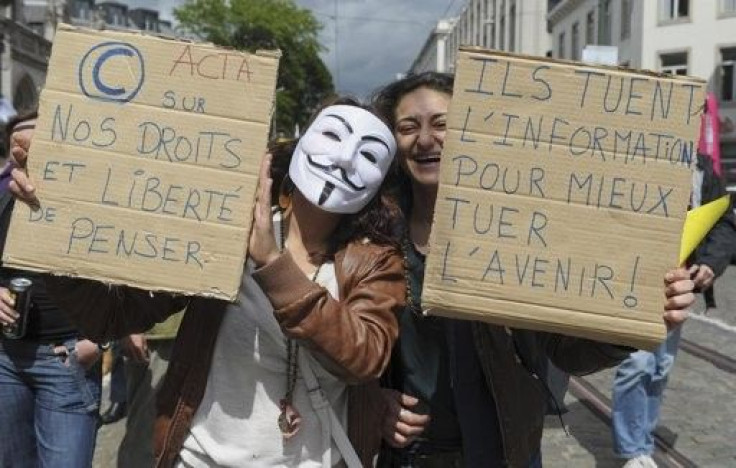Facing Popular Revolt, Europe Rejects Treaty To Fight Copyright Infringement

The European Parliament soundly rejected Wednesday the Anti-Counterfeiting Trade Agreement, or ACTA, an international treaty that aims to standardize intellectual property and copyright enforcement efforts digitally and physically across signatory countries.
The treaty was struck down 478 to 39 with 165 abstentions. Ratification of the treaty required approval from both the European Parliament and the European Council, the EU executive body. This doesn't stop the United States, Canada, Singapore, South Korea and others from moving forward with the ratification process, but global consensus by key counties is required for effective enforcement.
The treaty contains six articles, including criminal penalties and steeper fines that are sufficiently high to provide a deterrent to future acts of infringement. It also establishes a framework for border guards to act on behalf of copyright holders to act on suspicion that travelers possess counterfeit or pirated goods intended for commercial distribution.
EU ratification efforts have been fought by opponents who claim the new standards amount to invasion of digital privacy. The parliament received a petition signed by 2.8 million people worldwide urging it to reject the treaty as it stands.
While debating whether to give its consent to ACTA, Parliament experienced unprecedented direct lobbying by thousands of EU citizens who called on it to reject ACTA, in street demonstrations, e-mails to MEPs and calls to their offices, said a statement announcing the results of the vote.
Critics have also lambasted the closed-door negotiating process that led to the formation of the treaty. In its early stages of development the treaty included criminal sanctions for using the Internet to break copyright law. An early proposal included searching digital music players at border crossings for pirated music, but that didn't make it into the final draft.
Responding to the vote, EU Trade Commissioner Karel De Gucht said he is not ready to throw in the towel.
I also welcome the debate which ACTA has created among Europe's citizens on the importance of stopping the trade of illegal, counterfeit goods and protecting our intellectual property for Europe's economy and jobs, De Gucht said in a statement. Today's rejection does not change the fact that the European Commission has committed itself to seeking answers to the questions raised by the European public.
The official vowed to continue his efforts to get the European Court of Justice to rule on whether the treaty violates freedom of speech or other fundamental rights.
Jim Killock, of the Open Rights Group, which has been fighting ACTA ratification, told The Telegraph the vote was a tremendous victory for the movement, for democracy and for every European citizen that has demanded that their rights be respected. ACTA must be abandoned.
© Copyright IBTimes 2024. All rights reserved.












